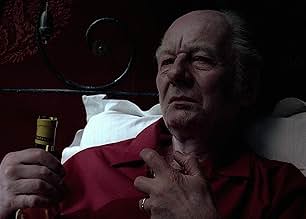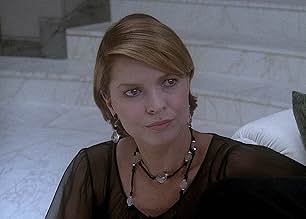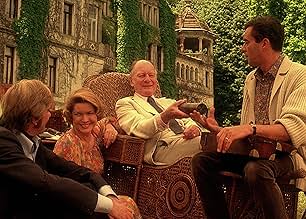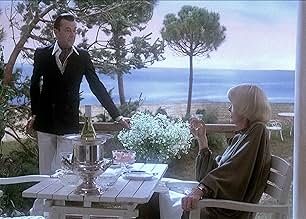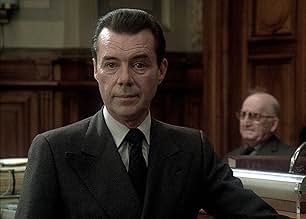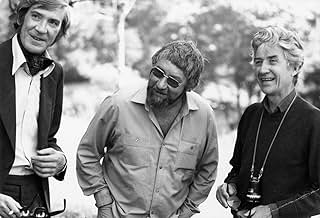AVALIAÇÃO DA IMDb
7,4/10
3,7 mil
SUA AVALIAÇÃO
Adicionar um enredo no seu idiomaA dying writer bases his last book on his own perception of his family.A dying writer bases his last book on his own perception of his family.A dying writer bases his last book on his own perception of his family.
- Prêmios
- 11 vitórias e 2 indicações no total
Denis Lawson
- Dave Woodford
- (as Dennis Lawson)
Avaliações em destaque
I saw this film at release and have seen it several times since and this motion picture still holds up, a seemingly complex story that unravels steadily
throughout the film. Resnais uses every dramatic device available to tell what becomes a moving and tender portrait, not least visual puns, particularly a
sequence where Dirk Bogarde drives across "town", in which a very simple
montage predates digital morphing as seen in current commercials, smoothly
linked through the activity of the character. All good Resnais films include an examination of the minds of his characters and this is a superb twist-and-turn reality that involves us completely. The acting of course is flawless and includes a wonderful pairing of the great Elaine Stritch and Ellen Burstyn. David Warner, a personal favorite, is actually given the opportunity to act and steps up to the plate and compliments Dirk Bogarde's cool and wooden portrait. I regularly look for this release on DVD and am consistently disappointed. Could someone
publish it soon?
throughout the film. Resnais uses every dramatic device available to tell what becomes a moving and tender portrait, not least visual puns, particularly a
sequence where Dirk Bogarde drives across "town", in which a very simple
montage predates digital morphing as seen in current commercials, smoothly
linked through the activity of the character. All good Resnais films include an examination of the minds of his characters and this is a superb twist-and-turn reality that involves us completely. The acting of course is flawless and includes a wonderful pairing of the great Elaine Stritch and Ellen Burstyn. David Warner, a personal favorite, is actually given the opportunity to act and steps up to the plate and compliments Dirk Bogarde's cool and wooden portrait. I regularly look for this release on DVD and am consistently disappointed. Could someone
publish it soon?
Renais "Providence" has all the hallmarks of cinema at its artistic best. Every component of film making is expertly handled. David Mercer's literary screenplay is a joy to listen to, especially when delivered by the likes of Dirk Bogarde and of course the legendary John Gielgud. The visuals are haunting and perfectly shot with detailed attention to set and costume. Miklos Rosza's soundtrack is in total accordance with the work as a whole, never intrusive, while adding to the rich tapestry that is "Providence". Renais too has assembled a wonderful if somewhat odd cast, which suitably serve this somewhat odd film.
Gielgud plays a dying author whose mind is racing with fantasies peopled by members of his family. His character Clive Langham is depicted as a ribald, sensual, womanizer. Yet his fantasies, making up the bulk of the film, are curiously cold and stark. They are played in bleak settings with an ever present sense of impending catastrophe, though remaining totally devoid of emotion. These imaginings are at completely at odds with their creator. The extreme incongruousness of these fantasies with the character to whom they belong, remains a mystery. This detracts much in the way of emotional impact which is very much lacking in the film, whether intentional or not. The elimination of emotion leaves "Providence" a cold, wonderfully intelligent exercise in the art of film making.
Renais has assembled an intriguing cast headed by the superb Gielgud. Dirk Bogarde whose performances have often been tinged with a cold, sauve superciliousness brings this unpleasant quality to an unparalleled level of extremity. Even the usually over emoting Ellen Burstyn delivers a restrained performance. Elaine Stritch has to be the oddest choice for the role being so contrary to her well known persona. Never has a more unlikely coupling been presented than Stitch and Bogarde as lovers. Yet in this emotionless void, even that becomes acceptable.
"Providence" is a highly unusual, important film and shouldn't be missed by the discerning film enthusiast. Yet despite the wealth of cinematic craft on display it remains an unsatisfying experience.
Gielgud plays a dying author whose mind is racing with fantasies peopled by members of his family. His character Clive Langham is depicted as a ribald, sensual, womanizer. Yet his fantasies, making up the bulk of the film, are curiously cold and stark. They are played in bleak settings with an ever present sense of impending catastrophe, though remaining totally devoid of emotion. These imaginings are at completely at odds with their creator. The extreme incongruousness of these fantasies with the character to whom they belong, remains a mystery. This detracts much in the way of emotional impact which is very much lacking in the film, whether intentional or not. The elimination of emotion leaves "Providence" a cold, wonderfully intelligent exercise in the art of film making.
Renais has assembled an intriguing cast headed by the superb Gielgud. Dirk Bogarde whose performances have often been tinged with a cold, sauve superciliousness brings this unpleasant quality to an unparalleled level of extremity. Even the usually over emoting Ellen Burstyn delivers a restrained performance. Elaine Stritch has to be the oddest choice for the role being so contrary to her well known persona. Never has a more unlikely coupling been presented than Stitch and Bogarde as lovers. Yet in this emotionless void, even that becomes acceptable.
"Providence" is a highly unusual, important film and shouldn't be missed by the discerning film enthusiast. Yet despite the wealth of cinematic craft on display it remains an unsatisfying experience.
How often do we awake from our dreams in a sweat, not knowing what is real and what is illusion? Especially if we are feverish, our dreams can turn close friends or family members into ogres and hateful creatures (or possibly werewolves) who are bent on our destruction. Such is the case with novelist Clive Langham (John Gielgud), a dying 78 year-old writer who is working on his final novel in the playfully bizarre 1977 English language film, Providence, by Alain Resnais (Hiroshima Mon Amour, Last Year at Marienbad, Muriel). The film depicts how physical and mental anguish can distort our view of reality. A poetic screenplay by playwright David Mercer and powerful performances by John Gielgud, Ellen Burstyn, Dirk Bogarde, Elaine Strich, and David Warner provide strong support.
Clive does not go gentle into that good night. During one horrific night, all the pain of his life and disturbing family relationships boil to the surface. In the novel being played out in the author's mind, his family members, sons Claude (Dirk Bogarde) and Kevin (David Warner), and Claude's wife Sonia (Ellen Burstyn), mysteriously become the main protagonists, assuming roles as prosecutors and defendants, feuding spouses, and extra-marital lovers. As Clive goes deeper into the maelstrom, images become more and more hallucinatory. The denouement is witty, baffling, irritating, and then finally transcendent. To say that the ending is a surprise is a major understatement.
Providence may exasperate you but, if you have patience, it can be a richly rewarding experience. As with all thought provoking and multi-layered films, multiple viewing may be required for full appreciation. Providence was voted the greatest film of the '70s by an international jury of critics and, at Telluride, Norman Mailer called it "the greatest film ever made on the creative process".
Clive does not go gentle into that good night. During one horrific night, all the pain of his life and disturbing family relationships boil to the surface. In the novel being played out in the author's mind, his family members, sons Claude (Dirk Bogarde) and Kevin (David Warner), and Claude's wife Sonia (Ellen Burstyn), mysteriously become the main protagonists, assuming roles as prosecutors and defendants, feuding spouses, and extra-marital lovers. As Clive goes deeper into the maelstrom, images become more and more hallucinatory. The denouement is witty, baffling, irritating, and then finally transcendent. To say that the ending is a surprise is a major understatement.
Providence may exasperate you but, if you have patience, it can be a richly rewarding experience. As with all thought provoking and multi-layered films, multiple viewing may be required for full appreciation. Providence was voted the greatest film of the '70s by an international jury of critics and, at Telluride, Norman Mailer called it "the greatest film ever made on the creative process".
Since so many good comments have been written here, mostly on the psychological side of the characters, and they are all excellent, I decided to comment upon a very present entity and that is WINE.
Notice that, until the last scene, everybody drinks white, mostly CHABLIS, an acid one. But on that last scene Resnais shifts to RED. It is no accident, it has in my modest opinion, a way that illustrates a very fundamental change in the feelings that occurred in that lunch.
Criticism and over-analysis, ever present till that event, give way to peaceful acceptance of the characters by the father, Without hypocrite sensibility, that he refuses, but with warmth and tolerance.
Well, I do believe, by some 55 years of experience, that white wine (dry, European style) makes one restless and sometimes bitter.
Red wine makes one more relaxed and happy.
I do not know which kind of wine Resnais prefers, but since he is a Breton I would not be surprised, that it is WHITE. Maybe that is the reason why His movies are so difficult to decode. They are also some of the most magnificent works of cinematic art..
Notice that, until the last scene, everybody drinks white, mostly CHABLIS, an acid one. But on that last scene Resnais shifts to RED. It is no accident, it has in my modest opinion, a way that illustrates a very fundamental change in the feelings that occurred in that lunch.
Criticism and over-analysis, ever present till that event, give way to peaceful acceptance of the characters by the father, Without hypocrite sensibility, that he refuses, but with warmth and tolerance.
Well, I do believe, by some 55 years of experience, that white wine (dry, European style) makes one restless and sometimes bitter.
Red wine makes one more relaxed and happy.
I do not know which kind of wine Resnais prefers, but since he is a Breton I would not be surprised, that it is WHITE. Maybe that is the reason why His movies are so difficult to decode. They are also some of the most magnificent works of cinematic art..
A dying artist, beautifully acted by Fainsilber, struggles to complete one last book before he dies - the plot of which becomes confused with his own troubled life as he thinks and dreams his way through the night. This was the first film in English for master film-maker Alain Resnais, and also happens to be one of his best. Using a variety of surreal cinematic techniques, Resnais is able to capture the characters of everyone in the film perfectly and his style - combined with excellent scripting - makes for an experience that will not be forgotten. Although the first half of the film will probably be spent in confusion, before you actually realise what is going on - I had to see this film several times before I was satisfied - it is worth struggling to understand this complex and thoroughly entertaining artistic movie.
Você sabia?
- CuriosidadesSir John Gielgud, who spent most of his career on the stage, considered this movie and the television mini-series Memórias de Brideshead (1981) to be his only two screen appearances of which he was genuinely proud.
- Citações
Clive Langham: Don't you think to have only one bastard after sixty years of action is almost tantamount to self denial?
- Cenas durante ou pós-créditosThe National Philharmonic Orchestra is misspelled as National Philarmonic Orchestra in the opening credits.
- ConexõesFeatured in Zomergasten: Episode #7.4 (1994)
Principais escolhas
Faça login para avaliar e ver a lista de recomendações personalizadas
Detalhes
- Tempo de duração
- 1 h 50 min(110 min)
- Cor
- Proporção
- 1.78 : 1(original ratio)
Contribua para esta página
Sugerir uma alteração ou adicionar conteúdo ausente

